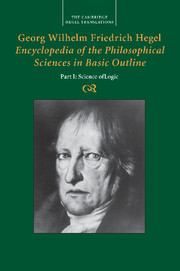 Georg Wilhelm Friedrich Hegel: Encyclopedia of the Philosophical Sciences in Basic Outline
Georg Wilhelm Friedrich Hegel: Encyclopedia of the Philosophical Sciences in Basic Outline Book contents
- Frontmatter
- Contents
- Acknowledgments
- Introduction: Hegel’s Encyclopedia Logic
- Translators’ Note
- Encyclopedia of the Philosophical Sciences in Basic Outline, Part I: Science of Logic
- Part I Science of Logic §§ 19–244
- Bibliography
- Glossary of Translated Terms, German to English
- Glossary of Translated Terms, English to German
- Index
Preliminary Conception §§ 19–83
Published online by Cambridge University Press: 30 September 2021
- Frontmatter
- Contents
- Acknowledgments
- Introduction: Hegel’s Encyclopedia Logic
- Translators’ Note
- Encyclopedia of the Philosophical Sciences in Basic Outline, Part I: Science of Logic
- Part I Science of Logic §§ 19–244
- Bibliography
- Glossary of Translated Terms, German to English
- Glossary of Translated Terms, English to German
- Index
Summary
§19
Logic is the science of the pure idea, i.e. the idea in the abstract element of thinking.
The same proviso that holds generally for the concepts prefacing the philosophy – namely, that they are determinations drawn from and subsequent to the survey of the whole – also holds for this as well as other determinations contained in this preliminary conception.
It can indeed be said that logic is the science of thinking, of its determinations and laws. However, thinking as such constitutes only the universal determinateness or the element in which the idea exists qua logical. The idea is thinking not insofar as the latter is formal, but insofar as it is the self-developing totality of its distinctive determinations and laws, which it gives itself and does not already have and find within itself.
Logic is the most difficult science in that it has to do not with intuitions – and not even with abstract sensory representations as in geometry – but with pure abstractions. It requires a certain strength and versatility to retreat into pure thought, to hold on to it steadfastly and to move about in it. On the other hand, logic could be considered the easiest science, because its content is nothing but one's own thinking and its familiar determinations, and these are at once the simplest and the elementary sort of determinations. They are also what is most familiar, namely being, nothing, etc., determinateness, magnitude, etc., being-in-itself, being-for-itself, one, many, etc. This familiarity with them, however, makes the study of logic even harder. On the one hand, it is readily held to be not worth the effort to occupy oneself with such familiar things and, on the other, the point is to become familiar with them in a way that is entirely different from, indeed even opposed to, the way one is already.
The usefulness of logic concerns the relationship to the subject, namely, the extent to which the subject [thereby] provides himself with a certain education for other purposes. His education through studying logic consists in acquiring practice in thinking, since this science is a thinking of thinking, and in getting thoughts into his head [precisely] as thoughts.
- Type
- Chapter
- Information
- Georg Wilhelm Friedrich Hegel: Encyclopedia of the Philosophical Sciences in Basic OutlinePart I: Science of Logic, pp. 47 - 134Publisher: Cambridge University PressPrint publication year: 2010
